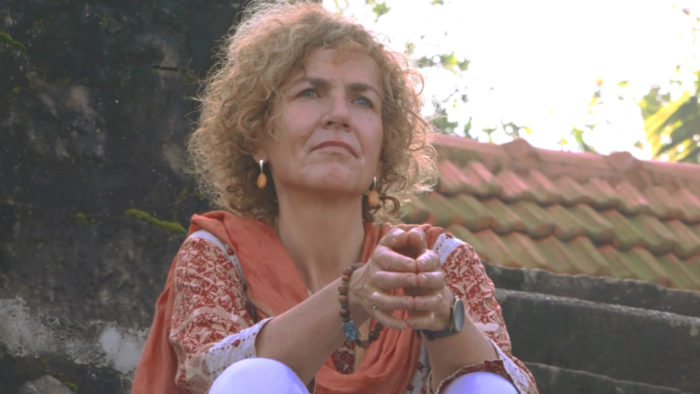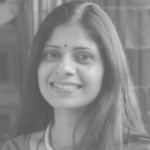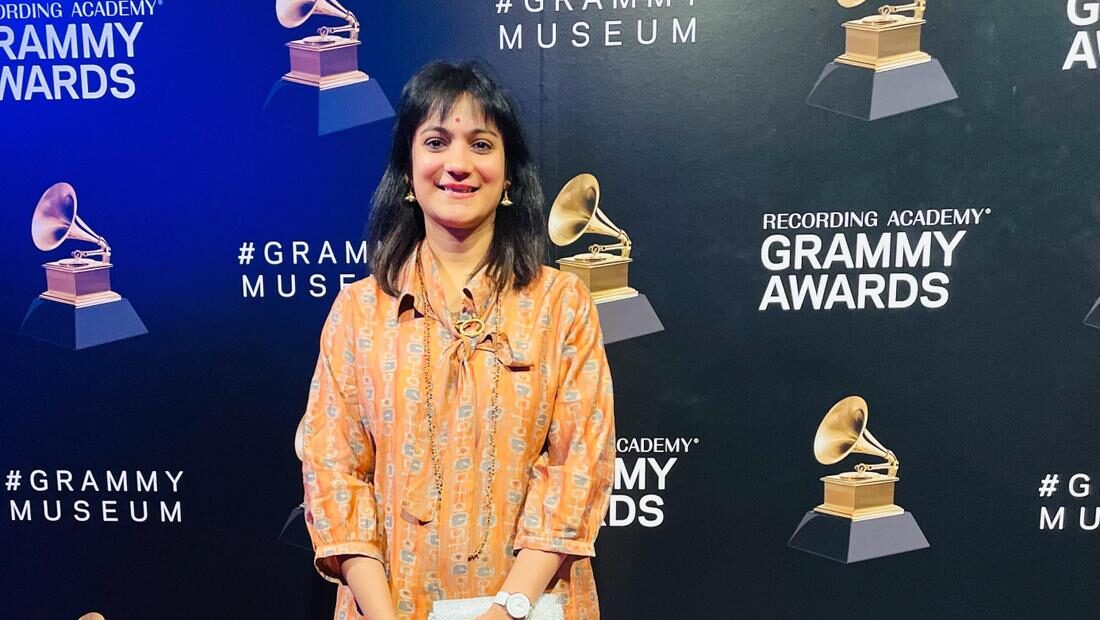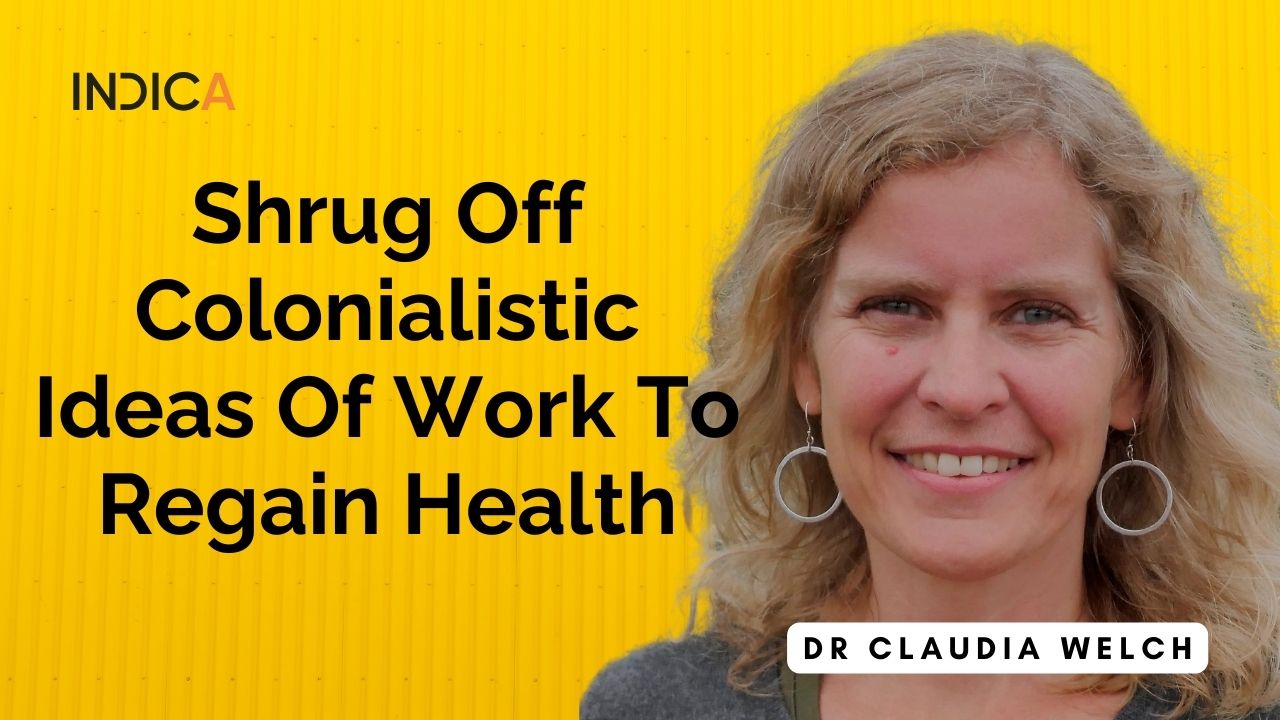“Is it possible to live a more peaceful and creative life on our planet? In a time when the state of the planet poses important questions: What is life worth to us? And what do we still consider sacred?” asks Renata Keller, a filmmaker based in Germany and Switzerland.
These questions inspired the Director to meet the Indian mystic, philosopher and grassroots activist Vimala Thakar (1921 – 2009). It was an encounter that deeply inspired and changed Renata’s life. Almost twenty years later, she researches the profound work of this fascinating woman again in the context of our time, and translates her urgent call for holistic thinking and action into a cinematic work of art.
The film In the fire of dancing stillness – Reflections with Vimala Thakar shows the impressive life of an independent Indian woman who sensed the new potential of human coexistence by turning inwards to explore inner life.
Through Renata’s film we meet a female spiritual seeker who went against accepted norms in the middle of the 20th century. Thakar studied the Vedas and Upanishads, and learned Sanskrit. She struggled passionately to find her own linguistic expression that would convey and communicate her heart‘s desire for inner and outer peace. The film director takes us on an explorative journey where we first meet Vimala Thakar as a young woman.
Unimpressed by several marriage proposals, she joined Vinoba Bhave‘s peaceful land reform movement in India and along with hundreds of fellow campaigners she walked all across India by foot, convincing rich landowners to give a part of their land to poor farmers, so they could build up their own independent existence. The Vinoba movement was, and still is, one of the few non-violent revolutions worldwide in which people gave away land for purely humane and heartfelt reasons, without being forced to do so by a powerful authority (from Renata's website).
Vimala Thakar had to end her commitment with the movement due to a car accident. Her subsequent meeting with the philosopher and author Jiddu Krishanmurti changed her life radically, and she finally realized what had become clear for her over the years: That only the inner work and a transformation of one’s own consciousness will counteract the violence and aggression in oneself and in the world. She decided to dedicate her life to following the inner path and was soon invited to Europe, South America and India, where she began to give lectures and seminars on inner transformation.
Renata says the film illuminates her collaborative and creative ways of working and responding, a more female and intuitive way of leadership. For over 30 years she travelled throughout India and the world, met thousands of people, and led hundreds of social worker camps in India. During Vimala‘s lifetime, 92 books were published about her work in English, 29 books in Marathi, 123 books in Gujarati and 47 books in Hindi and translated into other European languages. This illustrates the spread of her influence in Asia, Europe and America. Nevertheless, she was very shy, and not liking fame or media presence, she remained relatively unknown despite the volume of her work and activities.
“As we are faced with the great challenges of the 21st century, Vimala asks us that our lives should be the expression of a new dynamic of human relationships, a new culture based on inner stillness. In view of a growing sense of meaninglessness in the globalized and technologized world that we have created, she encourages us to find strength in silence and contemplation. And now that civilization is facing serious challenges, we are called to create and shape new forms of co-existence between people and nature,” says Renata.
The film is an invitation to go deep within and to take a fresh look at ourselves and the world around us, with a rejuvenated curiosity for life. In this contemplative space, the dominant stance of knowledge and thinking is questioned, and a non-verbal exploration of existence comes to the fore.
In this interview with CSP Renata talks about her film and how Ayurveda saved her from burnout.
Was your first trip to India during the shooting of the film on Vimala Thakar - The Fire of Dancing Stillness?
No, I have travelled to India since the early nineties. I have been on a spiritual search since I was a teenager and that brought me first to Buddhism during my travels in Thailand and then to India later on. After my visit in Mount Abu and seeing Vimala Thakar in 2001, I did not travel to India until 2013 where I went to the Ayurvedic Healing Center Vaidyagrama.
The film In the Fire of Dancing Stillness is my first professional exchange with India. Since my first visits, India has always been in my being wherever I go. I hope I can take up more projects there and I would like to learn so much more about the ancient wisdom of India.

With children during the shooting of the film
What inspired you to make The Fire of Dancing Stillness? It seems to be different in conceptualization from your other films.
I actually think there is a continuation through all my films event though it appears differently. I am interested in the questions of how life works and how we can find solutions to difficult social, spiritual or ecological problems. I am also fascinated by heroic women who have paved important ways in life and society (like Gerda Lerner) and how they have managed to find their ways and develop their creative thinking within a prominently (still) patriarchal society.
The film I made on the healing relationship between plants and human beings (www.echteheilung.ch) was done out of an urge to show the beauty of nature and its incredibly miraculous ways of interacting with us humans.
With Gerda Lerner, like with Vimala Thakar, it was a calling to make the film, it was not a decision. I had met Vimala Thakar for only three days in 2001 and that meeting had a profound impact on me. Her presence was so humble and yet so powerful at the same time. I always had some books of her with me on travels or next to my bedside table after that visit and was and still am inspired every time I opened the books. I was also very inspired about the way she lived, the profound integrity and dignity she incorporated and how she cared on all levels for humans down to animals and nature as a whole.
In the beginning, when I started to have that calling to make the film, it looked like an impossible task as I did not know anyone who had spent longer time with her, nor did I have any material like photos or video material on her. But people and things appeared along the way and also the confirmations that I should make this film. I did want to present her in her authenticity and modesty, which is not very easy through the medium of film. But I tried to incorporate her deep love for silence and space in the film as well as her Indian and Vedic roots, so the film became more experimental than a classic documentary film.


Above: Sketch of Vimala Thakar by Renata, Below: Vimala Thakar at 18
Vimala ji spoke about creativity and divinity. How do these concepts operate in your work?
Vimala Thakar's views on life are very profound. Her foundational perspective on life is that everything is sacred, that every moment in our lives can be sacred and that if we are truly in touch with that fact, we can also act out of that deep source that allows us to act in creative and freeways. For that we also want to be in love with stillness and with silence. Because there the original order of things come close to us and we can feel the profound unity with life.
I try to work on every project with that attitude and I also need times to dive into this silence, to drink - so to speak - on the fountain of creativity, which is stillness. The sense of beauty and aesthetics is also an important factor. Because beauty, especially beauty in nature, is something that needs to be recognised in its sacredness, in its wonder and its unknown source. We can be truly humbled when we look at a flower or at a tree or a beautiful landscape because we get in touch with the hidden laws of the cosmos. And also, we just don’t know who is behind this beauty… and it is beyond us, we are not the creators. The sense of self-importance that we carry quite unconsciously as human beings, vanishes in those moments as we can see that there is an implicit order of life that we are usually no aware of as we perceive life in such fragmentary ways. I try to deepen my understanding of all these insights day by day, moment by moment and am always hitting against the grossness of being a human being… I guess this is why we have to evolve really fast so that our actions come from a place of wholeness rather than fragmentation and we find a way to live with all creation in collaborative rather than destructive ways.
How did you come to Ayurveda? Have you filmed anything at Vaidyagrama?
In 2013 I was very close to what we call in the West “Burn Out”. But I did not want to enter the Western Medical system as I did not trust how they would respond to my exhaustion. I did not want to be psychologised. I knew I was physically and mentally exhausted because I had gone through a very intense period in my life, both in my work but also in relationship to friends and deep inner spiritual changes. So I looked up on the Internet, without knowing anything about Ayurveda. But it was actually a good friend who was travelling in India who recommended Vaidyagrama to me. It was only about 2 years open at that time. I was longing to be in a warm, loving environment and non-problem oriented approach to healing. Although I had gotten acupuncture treatments in the past and have big respect for the Chinese healing system, I felt that this approach was going to be too sterile. I had heard that Ayurveda was applying warm oils in their massage and just the thought of it made me feel better. So I was really innocent when I decided to go to Vaidyagrama and did not know what was going to happen once I enter Vaidyagrama. But I will never forget the friendly and warm welcoming by everyone, especially the doctors and therapists on my first day. And I became good friends with Dr. Ramkumar soon, after having some important and profound conversations with him about the state of the world and the influence of Ayurvedic approaches in our times. I then invited him to come to Berlin the next year to present Ayurvedic thinking in one of my Salons.
I always have my little camera with me when I travel and took it also to Vaidyagrama. So I always film things that happen in front of me….

Renata at Vaidyagrama
Ayurveda and Yoga are very popular in Europe . How do you describe the difference between those offerings and Vaidyagrama?
I feel very lucky that I discovered Vaidyagrama (Www.vaidyagrama.com
Www.punarnava.org) before going to any other places. I truly like the serious approach to health and how the doctors and therapists treat their patients, also the community feeling between patients and workers…. I think it is unique. I also appreciated so much the morning and evening prayers, especially that the doctors were leading the chants. It made me look at the art of healing in a profoundly different way. This approach, that the doctors REALLY care about your health and are so concerned about your healing is radical and it is something that in our materialistc and capitalist health care system in the West is totally absent.
I cannot say much about European offerings of Ayurveda as I have not taken up any although I respect very much the people who want to bring the Ayurvedic philosophies to the West. But I did not want to dilute my experience in Vaidyagrama with a more superficial approach.

Do you think that documenting Ayurveda through films can create awareness in the West?
Yes, I think so for sure. There are some documentaries on Ayurveda. I have not found yet a film that presents the deep and ancient wisdom of Ayurveda in an authentic way and in its complex wisdom. Often Ayurveda in the West is still seen as a kind of expensive Wellness Treatment approach….
How do you think strong women can change the course of history as seen in the lives of the two women you have documented
As women, we did not learn about our own history. We did not learn about our heroines of the past as they did not even enter the history books. I don’t know how it is in India, but in the West, history classes are all about the important wars, conquerors, colonial powers and the powerful landlords, beginning with the Romans and Greeks right into present history and politics. There are rare historians who write about the history of human beings and especially about the welfare of women. Where were the women when the men went to war? What did they do?
Women often made sure a society would still function while men were prone to destruction and death in the name of saving their own country. We have to question, by the way, this crazy way of thinking and contemplate a future where wars are just not going to happen anymore as we have seen through its futility.
The field of Women`s history that Gerda Lerner innovated, has changed thousands of women’s lives. To know that we have a history, that other strong women existed in the past and that they struggled similar things that we are struggling with today, but were independently innovating new ways of thinking in science, art and other fields of life, that is inspiring. It gives us roots and a backbone, an inner support. Both Vimala Thakar and Gerda Lerner were very independent thinkers who encouraged women to think for themselves and to also free themselves of the patriarchal structures they were embedded in. We need women like this to give us strength and faith that we can find our own voice and change the social structures that are not supporting human and natural life to create more holistic lifestyles. I know that my life has changed deeply after learning so much about these two and many more other influential women and I also know from many women who made very different decisions in their lives after they saw the films about those women. We have to give each other courage and faith. When one woman does that, that is incredibly encouraging and can lead another woman to go in new directions.
The universal qualities of friendliness, care, social cohesion is in India still very profound and I am again and again in admiration of it, how it works. I also feel that because India has such a deep connection for millennia with the spiritual dimension of life, it has a responsibility to the world. It is the soul of our planet and it needs to take its place for this.
Have you found that there are many misconceptions about India outside her shores?
I think it is always easy to interpret another country from what we read in the papers or from hearsay, and especially through our (superior) glasses of our culture. Also, if we don’t understand another culture well in its traditional and political structures, we misunderstand a lot of what is going on.
I have met many times people who had a strong view about India that it is chaotic, poor and that women are being treated very badly. All of this has a big grain of truth in it. But the criticism is often taken out of context, or to insist on a certain point. The deeper currents of what holds a society together is often dismissed. The social construct is SO different than in the west. In India there is no official Health Care System but the people are ready to help each other and are very creative in finding solutions. And as a foreigner it is sometimes very hard to see how a society works in very different ways. The universal qualities of friendliness, care, social cohesion is in India still very profound and I am again and again in admiration of it, how it works. I also feel that because India has such a deep connection for millennia with the spiritual dimension of life, it has a responsibility to the world. It is the soul of our planet and it needs to take its place for this.
To be so tempted by money, materialism and fame is going to be destructive for India. India needs to also enhance the rural areas again, support small farming systems and give the poor a chance to create small businesses. Otherwise India will have the Mega cities without rural backup. I think there is great potential that India could flourish in a kind of traditional modesty and very smart way of organising itself. India has always been amazing in gathering the masses for important causes, like the Gandhi movement or the Vinoba movement showed, or recently the mass tree planting sessions that happened in many places. And even now during Corona times, the Indians are very inventive. There is a deep intelligence in the Indian soul that is reflected in the Ayurvedic sciences and Vedic traditions that need to be believed and taken up by especially young people again.
How can you connect Vertical Impulse to your practice of Yoga and Ayurveda?
One of the first things I have learnt through Ayurveda is that silence is the best healer for an exhausted body. And Yoga teaches me to move in slow, exact movements, respecting the limitations of my body. Both is a metaphor for life and for work. Vimala says: Every act of living is an act of worship. For me, when I founded Vertical Impulse, it was a moment when I knew I was not going to distinguish “work” from “life” anymore but that I was going to follow my longing for wholeness. So, 16 years later, I can say that I “live” as much as I can according to what I have learnt. Again to quote Vimala, she says: Life is a Teacher. So every moment is a moment of discovery and a moment to act out of wholeness.
(After Renata Keller’s master’s degree in Applied Imagination at University of Arts in 2006, she went on to study documentary filmmaking in London. Renata’s lifelong pursuit of philosophical and spiritual questions, along with her interest in women’s development, led her to Gerda Lerner’s work and inspired the creation of Why Women Need to Climb Mountains (2016). In the film True Healing Arises in Freedom (2019) she accompanies the Biochemist Dr. Roger Kalbermatten in his research about the nature of healing plants and their relationship with humans. Her work can be viewed at www.verticalimpulse.com, www.inthefireofdancingstillness.com, www.echteheilung.ch/en)





